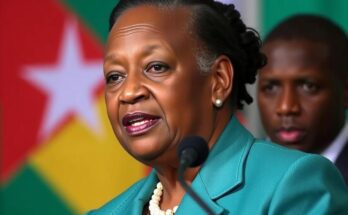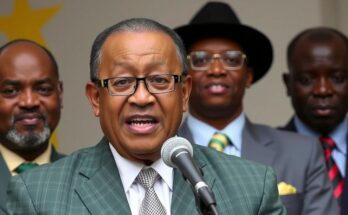Ghana’s illegal mining crisis, or “galamsey,” is impacting the country’s environment and becoming a critical issue in the upcoming presidential elections. Miners, under economic duress, face governmental crackdowns without viable employment alternatives. The interconnected crises of illegal mining and political accountability emerge as significant election themes as voters call for sustainable solutions and effective environmental policies.
Ghana is grappling with the ramifications of an unregulated illegal mining sector, known as “galamsey.” This booming activity not only poses significant environmental risks but also has become a contentious topic during the electoral campaign. In the town of Osino, miners like Frank, who seek to provide for their families amid unemployment, are caught in a precarious situation. With a backdrop of rising gold prices, illegal mining has thrived, contributing approximately 40% of the nation’s gold production while degrading agricultural lands and polluting critical water sources that millions depend upon.
Ahead of the election, candidates are under pressure to address the galamsey crisis as voters prepare to select the successor to President Nana Akufo-Addo. Notably, Vice President Mahamudu Bawumia of the New Patriotic Party (NPP) faces former president John Mahama from the National Democratic Congress (NDC) in a closely contested race. Miners like Frank express frustration over governmental crackdowns on illegal mining without offering alternative employment opportunities. As public dissatisfaction grows, activists call for effective policies to mitigate environmental damage, prompting skepticism regarding political promises.
Additionally, the illegal mining trade has disrupted Ghana’s cocoa production, threatening a vital revenue stream for the country. Experts, including Clement Abaidoo, emphasize that an effective solution requires meaningful engagement with stakeholders rather than surface-level enforcement actions. As the election approaches, the interconnection between illegal mining activities and political accountability becomes increasingly apparent, with citizens urging a focus on sustainable mining practices and environmental preservation for future generations.
The illegal mining phenomenon, referred to locally as “galamsey,” presents a significant challenge for Ghana. This practice, characterized by unregulated mining activities, has surged due to factors such as unemployment and rising gold prices. The environmental consequences are dire, leading to deterioration of arable land, contamination of water bodies, and damage to vital agricultural sectors like cocoa. As Ghana prepares for elections, the issue of illegal mining is increasingly intertwined with electoral politics, placing pressure on candidates to address these substantial concerns. The government’s previous attempts to curb galamsey have included military crackdowns, but these measures have largely failed to deliver sustainable solutions. The current political climate and the priorities of young voters reveal a demand for more effective and holistic strategies to address both unemployment and environmental degradation. This context sets the stage for a significant electoral decision, whereby voters will express their expectations for governmental responsibility and environmental stewardship.
In conclusion, the enlargement of Ghana’s illegal mining sector underscores a complex interplay of economic necessity and environmental degradation. As voters approach the polls, they are faced with the critical choice of candidates who can effectively address the pressing issues surrounding galamsey. With a notable lack of clear strategies from political parties to combat illegal mining while fostering sustainable economic development, the responsibility lies with the incoming administration to rectify these challenges and protect the nation’s natural resources. The impending elections serve as a watershed moment for systemic change, marked by citizens’ calls for accountability and justice.
Original Source: www.france24.com




